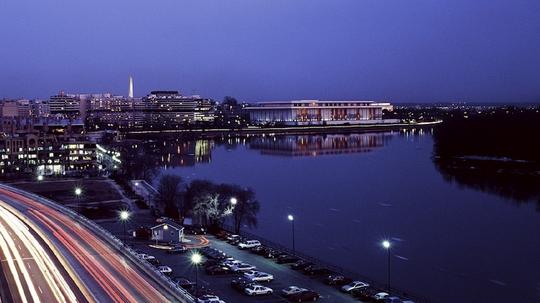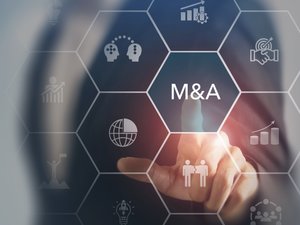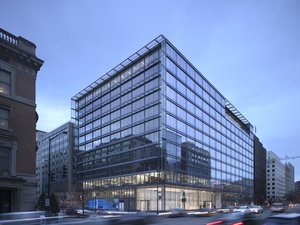
I'm asked about the state of the D.C. tech and startup scene more often than I would like.
It's a fair question. Unlike plenty of founders and investors in the region, the DC Inno team is chatting with people from all walks of the innovation scene nearly every day. So, it's never surprising when I get an email asking from D.C. tech newbies asking to grab coffee or when someone at an event finds me to find out what's happening in D.C.'s landscape. (To those, I would argue you should just be subscribed to The Beat. If you know us and aren't reading that, what's up?)
At the end of the day, though, it's just a tough question for me to answer in a simplified way.
In 2017, Washington came into its own as a tech hub, and the national tech sector responded. SoftBank made an investment here. An edtech company landed funding from The Rise Fund, which is backed by U2’s Bono, LinkedIn’s Reid Hoffman and Lynne Benioff, wife of Salesforce’s founder Marc Benioff. Eventbrite acquired a local event tech startup. At least one new co-working location opened seemingly every month in the metro area in response to customer demand.
All of this traction is in response to the D.C. area's ability to grow into its strengths and assets this year. I've always heard that one of the tech scene's "weaknesses" is its federal government influence. The argument goes that both founders and investors are too cautious and risk adverse. They research into a growing industry for so long that when they walk out of it, the moment is gone and onto the "next big thing."
D.C.'s foil, in that argument, is Silicon Valley where startups, like Uber, continue to bring in millions in venture capital despite a slew of miscalculated decisions to cover up sexual harassment, hackings and more.
In truth, what 2017 taught us, is that the Washington, D.C. metro area's startup scene is somewhere between those two images of the overly cautious federal government types and the overly careless Valley innovators. Now, I recognize I'm painting with a broad brush based on limited conversations with founders and investors. But let me walk you through two case studies to illustrate my point:
In Reston, Va., Appian has become one of the quiet victors of the national tech scene. As the D.C. metro area's sole IPO in 2017, a lot was weighing on the software company's Nasdaq performance, and Appian didn't disappoint. In August, Pitchbook put the firm at the fifth best performing IPO in 2017 so far. Appian's stock debuted at $12 per share. Today, the stock is riding steady around $20 per share, a 67 percent increase.
A lot of that can be attributed to Appian's mindset since it launched almost 20 years ago. They were bootstrapped and slow-and-steady was the name of the game. The founders didn't start out chasing venture capital dollars, and they weren't focused on high-speed growth. Instead, Calkins told me in October that, as they've grown, they've doubled down on the slow-and-steady method.
"We did it with a minimum of outside funding, just $10 million, and we got that nine years after we started the firm," Calkins said in an interview with DC Inno in October. "We’re almost a bootstrapped, and as such, we had to be resilient and opportunistic."
In D.C., we have bubbling story of 1776. The combination co-working group and venture fund merged with Philly-based co-working group Benjamin's Desk in October. In my own reporting on the merger, a pretty commonly held belief was that 1776 just grew too quickly. The firm launched in 2013 with the idea of being the hub for D.C. innovation and technology with backing from The District. Within three years, they were also bringing similar models to New York City and Dubai — while also trying to get an online software platform off the ground, manage a venture fund, add an accelerator program and grow its co-working offerings.
Reports from The Washington Business Journal show that 1776 was struggling to become profitable as it grew into new states, countries and platforms. The group seemingly moved its vision back and forth and stretched itself too thin. Now there's debate in D.C. tech circles over whether or not the Benjamin's Desk/1776 deal was a true merger or if it's an acquisition.
So, that's my answer. If you come up to me at an event or ask me in an interview, "Sam, what the heck was up with D.C. tech in 2017," I'd say this: 2017 was the year D.C. learned how to use its risk aversion and caution to its advantage. Startups, founders and investors are still taking risks and they're pivoting left and right (as seen in our 18 Startups to Watch in 2018), which shows that they're also learning how to use the Silicon Valley mentality, too. But the startups that benefited the most were the ones who took it slow and steady — even if that meant taking 20 years to get to an IPO.
Now, enough about me and my thoughts. Here’s what some of the top leaders in the D.C. area have to say on the year's past and what's to come in 2018:
Michelle Brown, CommonLit:
"Over the past year, I've seen promising signs that D.C. has a growing reputation as a legitimate tech hub. More and more tech startups are choosing to remain here, and this has created an exciting, growing community of entrepreneurs.
One downside of this saturation is that the competition for engineers is palpable, and it is especially difficult for tech nonprofits to attract the talent. I think there is an important role for universities and coding bootcamps to play in 2018 to ensure D.C. continues to grow as as a tech hub with a robust and diverse talent pipeline for companies and NGOs."
Amelia Friedman, Hatch Apps:
"In 2017, we really solidified our identity as a great city for women in tech, and rallied around that identity. We've been leveraging this unique value proposition to differentiate our tech scene in a really exciting way, even emphasizing it in our Amazon HQ2 proposal."
"I'm really excited to see D.C. gaining more traction as a great town for tech, and I'm excited to see more large tech companies open offices here and tap into our awesome (and diverse!) talent pool."
Jeremy Scott, cove:
"Summarizing the DC scene is a tall order, but since we’re focused on building neighborhood workspaces here at cove, I’ll focus on the local retail world. I would say that 2017 was a strong year for consumer food startups, with CAVA and Commonwealth Joe both completing large raises and with La Colombe opening its fifth location in the District. Just points to the growing demand for accessible, awesome food & beverage experiences in beautiful retail spaces as more and more housing comes online in DC proper. Who knows what 2018 holds in store — Amazon HQ2 seems like a long shot, but that would be a game changer for the city!"
Janice Omadeke, The Mentor Method:
"DC Tech has a lot of incredible problem solvers who are passionate about solving social issues through tech. Whether it's addressing police brutality, diversity and inclusion in the workplace, or access to clean water, I'm constantly humbled by the innovative ideas and businesses starting in DC, that are determined to fix systemic issues. There's been a strong focus on doing good in the world while also doing well and creating a sustainable business."
"Expect to see more collaborations among small businesses. Large companies are constantly pitched for partnership opportunities by hundreds of small businesses on a daily basis. Getting the visibility to get those large companies as customers (if that's what your goal is) can be a challenge when you're competing for the same amount of time, and if you don't have a direct connection to the buyer. To me, it makes sense to create joint proposals with businesses doing complementary work. You have a stronger offering, and get more businesses in the door faster. Hopefully, this will lead to a tidal wave of more DC startups getting growth opportunities. The Mentor Method will be testing this theory in 2018 with various companies to help lift the tide for as many startups as possible while helping us reach our milestones and create value for our customers."
Harry Alford, humble ventures:
"DC government has been consistent with investing in the city’s infrastructure. The MLK Library’s $208M renovation is a good example of this. However, the merger (or departure rather) of 1776 could also signal that DC still has a lot more to learn. In my humble opinion, this is somewhat a validation that it’s never been about the spaces, it’s supposed to have always been about the people that occupy the spaces.
My expectation is that DC will start prioritizing people over infrastructure in 2018. As the seed and early stage market cools down and VCs move up the stack, we will see new players step in to invest in entrepreneurs--the people who will build the next wave of hugely successful DC startups. Much like Tedco in Maryland and CIT in Virginia, I’m hoping it’s DC Gov."




